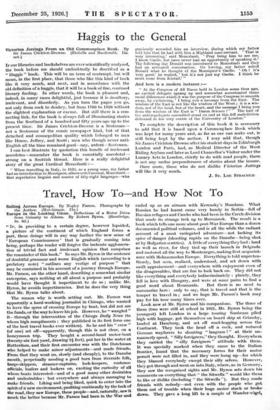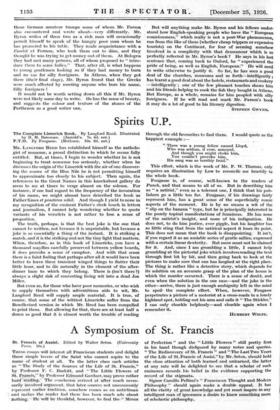Travel, How To—and How Not To
Sailing Across. Europe. By Negley Farson. Photographs by the Author. (Hutchinson. 21s.) " IF, in providing to a certain degree, however lopsided, a picture of the continent of which England forms a part, these doings will in any way further the new sense of `European Consciousness' that is gradually coming into
being, perhaps the reader will forgive the inchoate agglomera- tion of trivial fact and irrelevant opinion that comprises the remainder of this book." So says Mr. Byron in the sentence
of doubtful grammar and worse English which (according to a prefatory note) " outlines any vestige of purpose " that may be contained in his account of a journey through Europe. Mr. Farson, on the other hand, describing a somewhat similar enterprise, says nothing at all about a purpose and probably would have thought it impertinent to do so ; unlike Mr. Byron, he avoids impertinencies. But he does the very thing that Mr. Byron talks about.
The reason why is worth setting out. Mr. Farson was apparently a hard-working journalist in Chicago, who wanted to have the spree of crossing Europe by boat, but did not see the funds, or the way to leave his job. However, he " wangled " it—through the intervention of the Chicago Daily News (to whom high compliments : they published in its first form one of the best travel books ever written). So he and his " crew"
(of one) set off—apparently, though this is not clear, on a honeymoon trip. They bought a second-hand motor-boat (twenty-six foot yawl, drawing 2} feet), put her in the water at Rotterdam, and their first encounter was with the Dutchman who helped to make minor adjustments—and made friends.
From that they went on, slowly (and cheaply), to the Danube mouth, perpetually needing a good turn from riverside folk, barge-skippers, steamer-captains, lock-keepers, customs- officials, loafers and lookers on, exciting the curiosity of all whom boats interested—and of a good many other desirables and undesirables : but everywhere and always managing to make friends. Liking and being liked, quick to enter into the spirit of ti new environment, profiting continually by the luck of the road, they saw Europe, these people—and, naturally, saw it much the better because Mr. Farson had been in the War and
ended up as an airman with Kerensky's Russians. What Russian he had learnt came very handy in Serbia—full of Russian refugees and Czechs who had been in the Czech division that made its strange trek up to Murmansk. The result is a book which tells one more about post-War Europe than a dozen documented political volumes, and is all the while the radiant account of a most variegated adventure—not lacking its spice of danger (shooting rapids on the Danube—being shot at by Bulgarian sentries). A little of everything they had : land as well as river, for they tied up their launch in Belgrade and motored all the way to Montenegro, making first acquaint- ance with Mohammedan Europe. Everything is told unpreten- tiously, but seen, realized, understood, and set down with swift appraisement—and everywhere with enjoyment even of the disagrceables, that are fun to look back on. They did not like everything and everybody indiscriminately : plainly, they fell in love with Hungary, and were at some pains to find a good word about Roumania. But there is no need to summarize here : only to say, that is travel and that Is the temper to 'travel in ; and we hope Mr. Parson's book may pay for his tour many times over.
Look now at Mr. Byron and his companions. The three of them (two were still at school in 1921, Mr. Byron being the youngest) left London in a large touring Sunbeam piled high with luggage, got themselves on board ship at Grimsby, landed at Hamburg, and set off road-hogging across the Continent. They took the head off a cock, and reduced German wayfarers to shouting " langsam I " at their un- mannerly speed. " Silly foreigners," they thought. Everywhere they carried the " silly foreigners " attitude with them. It was specially marked when they came to the Italian frontier, found that the necessary forms for their motor permit were not filled in, and they were hung up—for which they blamed everybody except their silly selves. However, they got through and went on into Italy, where, as in Germany, they saw the recognized sights and Mr. Byron sets down his comments on everything that " the Shwas " would like them to like or dislike (including " the Sitwells "). But they made friends with nobody—not even with the people who got them out of trouble when their huge motor stuck or broke down. They gave a long lift to a couple of Wander-vogel, those German amateur tramps some of whom Mr. Farson also encountered and wrote about—very differently. Mr. Byron writes of these two as a rich man will occasionally permit himself to speak of the hungry poor man whom he has promoted to his table. They made acquaintance with a Fascist at Ferrara, who took them out to dine, and they thought he was trying to get money out of them. At Bologna they had met many persons, all of whom proposed to " intro- duce them to some ladies." That, after all, is what happens to young gentlemen looking as if they had money to burn and no use for silly foreigners. In Athens, when they got there (their final stage), Mr. Byron found that the Greeks were much affected by meeting anyone who bore his name. Silly foreigners !
It would not be worth setting down all this if Mr. Byron were not likely some day to write. He has the sense of beauty,. and suggests the colour and texture of the stones of the Parthenon as a good writer can.
- But will-anything make Mr. Byron and his fellows under. stand how English-speaking people who have the " European consciousness," which really is not a post-War phenomenon, run from the like of them Zwhether cheap trippers or expensive tourists) on the Continent, for fear of seeming somehow involved in a complicity with that demeanour which is so perfectly reflected in Mr. Byron's book ? He says in his last sentence that, coming back to Oxford, he " experienced the pride of being, as well as English, European." He will need to write otherwise to justify it. So far, he has seen a good deal of the churches, museums and so forth—intelligently ; has learnt a good deal about the hotels, restaurants and cookery ; one-of the few pleasant touches shows him and his friends helping to cook the fish they bought in Athens. But Europe, as a whole, remains for him peopled with silly foreigners. If he will read and mark Mr. Farson's book it may do a lot of good to his literary digestion.
STEPHEN GWYNN.



































 Previous page
Previous page